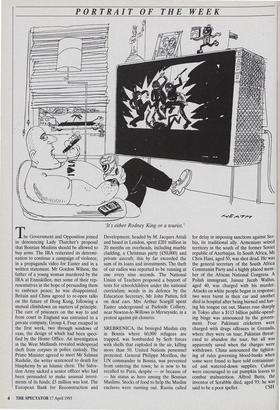PORTRAIT OF THE WEEK
`It's either Rodney King or a tourist.' The Government and Opposition joined in denouncing Lady Thatcher's proposal that Bosnian Muslims should be allowed to buy arms. The IRA reiterated its determi- nation to continue a campaign of violence, in a propaganda video for Easter and in a written statement. Mr Gordon Wilson, the father of a young woman murdered by the IRA at Enniskillen, met some of their rep- resentatives in the hope of persuading them to embrace peace; he was disappointed. Britain and China agreed to re-open talks on the future of Hong Kong, following a mutual climbdown on matters of principle. The care of prisoners on the way to and from court in England was entrusted to a private company, Group 4. Four escaped in the first week, two through windows of vans, the design of which had been speci- fied by the Home Office. An investigation in the West Midlands revealed widespread theft from corpses in police custody. The Prime Minister agreed to meet Mr Salman Rushdie, the writer sentenced to death for blasphemy by an Islamic cleric. The Salva- tion Army sacked a senior officer who had been persuaded to make unusual invest- ments of its funds; £5 million was lost. The European Bank for Reconstruction and Development, headed by M. Jacques Attali and based in London, spent £201 million in 20 months on overheads, including marble cladding, a Christmas party (£50,000) and private aircraft; this by far exceeded the sum of its loans and investments. The theft of car radios was reported to be running at one every nine seconds. The National Union of Teachers proposed a boycott of tests for schoolchildren under the national curriculum; words in its defence by the Education Secretary, Mr John Patten, fell on deaf ears. Mrs Arthur Scargill spent Easter underground at Parkside Colliery, near Newton-le-Willows in Merseyside, in a protest against pit closures.
SREBRENICA, the besieged Muslim city in Bosnia where 60,000 refugees are trapped, was bombarded by Serb forces with shells that exploded in the air, killing more than 50. United Nations personnel protested. General Philippe Morillon, the UN commander in Bosnia, was prevented from entering the town; he is now to be recalled to Paris, despite — or because of — his status as hero among the Bosnian Muslims. Stocks of food to help the Muslim enclaves were running out. Russia called for delay in imposing sanctions against Ser- bia, its traditional ally. Armenians seized territory in the south of the former Soviet republic of Azerbaijan. In South Africa, Mr Chris Hani, aged 50, was shot dead. He was the general secretary of the South Africa Communist Party and a highly placed mem- ber of the African National Congress. A Polish immigrant, Janusz Jacub Wallus, aged 40, was charged with his murder. Attacks on white people began in response; two were burnt in their car and another died in hospital after being burned and hav- ing his tongue cut out. Shares rose sharply in Tokyo after a $115 billion public-spend- ing binge was announced by the govern- ment. Four Pakistani cricketers were charged with drugs offences in Grenada, where they were on tour; Pakistan threat- ened to abandon the tour, but all was apparently saved when the charges were withdrawn. China announced the tighten- ing of rules governing blood-banks when some were found to have sold contaminat- ed and watered-down supplies. Cubans were encouraged to eat pumpkin leaves to combat malnutrition. Alfred Butts, the inventor of Scrabble died, aged 93; he was said to be a poor speller. CSH


















































 Previous page
Previous page